Starting an Herb Garden
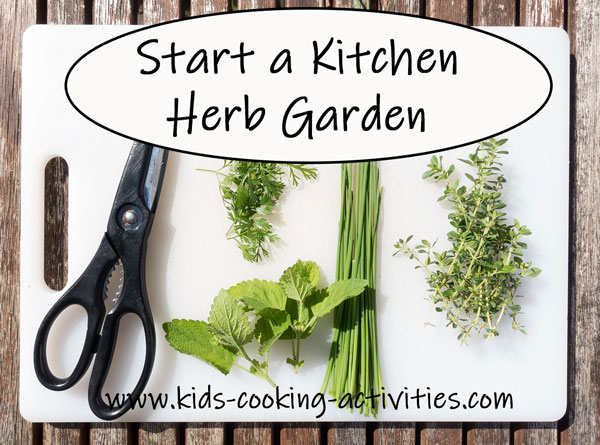
Starting an herb garden can be easy to do and with some simple research and a little gardening knowledge you will have a thriving garden that can add spice and flavor to your cooking. Growing herbs is easier than you may think, and once your herb garden is established then you may never buy herbs from a shop again.
Kids Cooking Activities Teaching Materials
Make teaching easier with our activities and recipes compiled in theme sets and books with an easy to read formatPerfect for teaching!
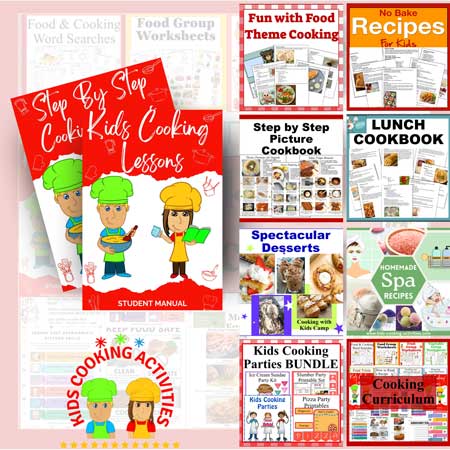
~This post may contain affiliate links and I'll earn a small commission if you shop through them. There is no extra cost to you. This is how we help support our family and continue to bring you amazing content. To learn more see the affiliates disclosure here.~
Where to Grow an Herb Garden
You will need to decide the location for your herbs and then
consider which ones you are wanting to grow. Some herbs grow very
well together and others have to have more sunlight and growing
space. Herbs thrive in the sunlight and choosing a sunny spot is
essential, as they need six hours of sun a day.
If you'd like an indoor herb garden, placing and starting an herb
garden near your kitchen door will remind you to use your herbs
daily. For some people this is more convenient as you can have
herbs grow year round. Starting an herb garden indoors is
also ideal for first time growers and people with very little
space as they can be placed on windowsills to allow the most
sunlight to your herbs. Unfortunately, you will be limited to the
amount of herbs you can
grow indoors.
Having an indoor or a small patch of ground outside makes a great
herb garden for children.
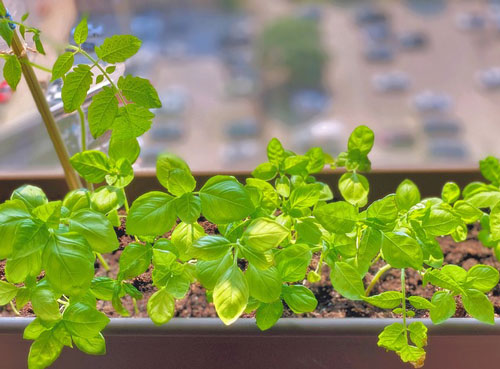
What Herbs to Grow
There are so many different varieties of herbs now available that
it can be difficult to decide which ones are the best to grow. If
you are a cook that likes to experiment and try different flavors
then starting an herb garden is a great idea. 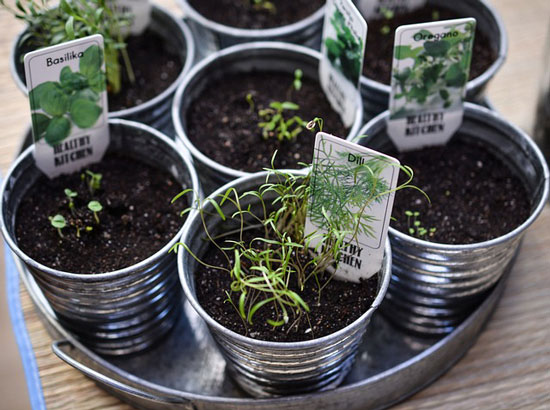
There are several herbs, which are very popular and work well
when starting herb garden. Experiment by growing different herbs
and see which becomes a favorite. Here are a few common herbs you
can grow.
- Basil is one of the
favorite herbs to use; it grows very easily and can be used in
many dishes or as a great garnish. Basil needs a lot of sunlight
to flourish so pick a very sunny spot away from the cold.
- Another great herb is parsley it is one of the most nutritious herbs and can be used in virtually every recipe. It has a mild and savory taste and is excellent for digestion problems; parsley grows very well indoors and likes to be sheltered in very sunny areas.
- Dill is a popular
herb, which has aromatic spice with a slightly sour flavor. It
is suited to dishes that require savory yet subtle spice, dill
grows well in sunny sheltered positions. It is fast growing and
very easy to cultivate.
- Mint is a fantastic
herb to grow it can be used in several different dishes and
drinks and is very easy to grow. It looks after itself and
doesn't need much care or attention to make it flourish.
- Chives are very
similar to onions in taste and they are a great substitute for
your cooking, you can use every part of this herb making them
very versatile. Chives grow well in full sunlight and in
well-drained soil.
You can buy an herb garden kit to make
it easier to start your herbs.
Caring for an Herb Garden
Wherever you decide to have your herb garden you will need to
care for it to enable the herbs to grow well. The herbs will
require just the right amount of water and must not be over
watered; the soil should be moist and not damp.
Timing is everything when it comes to picking your herbs; you need to ensure that you do this at the correct time. If you pick them too early then they won't be at their prime, and too late and they would have spoiled.
Picking herbs when you need them is great and one of the main reasons for starting herb garden. You can decide which ones you need and simply pick off however much you need for your meal.
Drying Fresh Herbs
If you wish to dry the herbs then they will need to be picked when they are freshest, this will lock the most amount of flavor into the leaves. It is better to pick the young leaves several times throughout the season, rather than wait for them all to be mature. Pick your herbs before they flower, bundle bunches of herbs together and allow to dry upside down or flat for several weeks. Herbs are dry when the leaves are brittle and easily break to pieces. If drying flat, turn every few days to ensure all leaves are drying equally.When ready to use your dried herbs, crush herbs with a mortar or
pestle or place them in a baggie and crush with a rolling pin.
Store in a cool, dry place-not next to the stove.
You can also freeze fresh herbs.
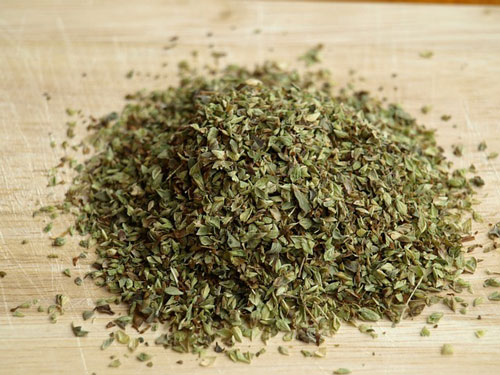
Using Fresh Herbs and Recipes to Try
When replacing fresh herbs with dried herbs, 1/4 teaspoon dried
herbs is equal to 2-3 teaspoons chopped fresh.
Herb Butter
Ingredients:- 1 Cup butter, softened
- 3-5 Tablespoons chopped fresh herbs, such as chives, parsley, oregano
- 1 Tablespoon lemon juice
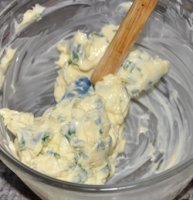
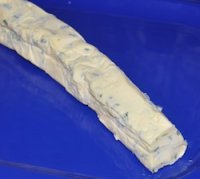
Herb Vinegar
In a glass jar, add bunch of fresh herb sprigs and whole spices. For fresh herbs try parsley, basil, lavender, lemon verbena, rosemary or thyme for great tasting vinegar. Whole spices can be peppercorns, chili peppers (for hot) or mustard seeds.You can also add whole garlic, peppercorns or lemon slices. Add 2 Cups white or apple cider vinegar. Put lid on and place in the sun. Let sit 2-3 weeks. Strain and store in glass bottle. Add more fresh sprigs in bottle for a pretty looking bottle and use for making salad dressings, marinades, potato salad, soups, etc.
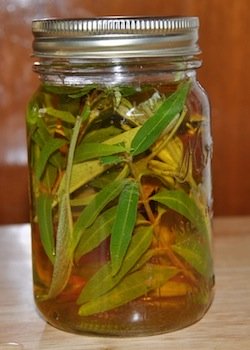
Pesto
Ingredients:- 2 Cups fresh basil
- 2 cloves garlic, peeled
- 2 Tablespoons lemon juice
- 1 Cup chopped almonds, walnuts or pine nuts
- 3/4 Cup olive oil
- 1/2 teaspoon oregano or 4-5 fresh leaves
- small bunch of fresh parsley
- 1/2 Cup shredded Parmesan cheese
- 2 Tablespoons pepper
- pinch of salt
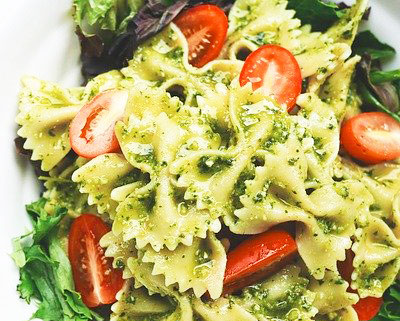
Eggs with Chives
Scramble 1-2 eggs per person in a bowl. Add shredded cheese, ham or chopped vegetables you like in your eggs. Season with salt and pepper. Add 1-2 Tablespoons chopped chives. Cook in skillet until eggs are done.~ Chives taste great with egg dishes so try them in quiches, egg casseroles and even just sprinkle top cooked eggs.
Starting an herb garden can be a very rewarding a beautiful hobby that will add flavor and spice to your home cooking!
Learn more about how to cook with herbs and spices.
More ideas for planning and growing your own food
Growing an Italian Pizza GardenGrow your food scraps
14 Plants for Kids To Grow in a Garden
Grow and Cook Kids Cooking Camp
Unlike other summer camp curriculum this one is designed to plant your seeds and watch them grow, then harvest them and try the recipes.Do you have a gardening tip or recipe?
Submit your favorite kids recipe
Do you have a favorite recipe your kids love to make? Or a recipe your kids ask you to make again and again? Share it with us!
Related Basic Cooking Lesson Pages:
~ Basic Cooking Lessons, ~ Stock and soups, ~ 5 mother sauces, ~ Yeast and baking breads, ~ Herbs and spices, ~ Vegetables, ~ Dry beans, ~ Grains, ~ Eggs, ~ Different cooking methods, ~ Growing an herb garden, How to Cook Q&A
Follow Kids Cooking Activities






